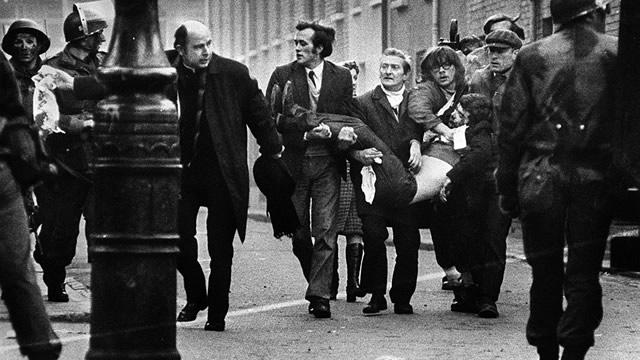
Bloody Sunday 1972
BRITISH government officials expressed “grave concerns” over sensitive documents linked to Bloody Sunday falling into the hands of solicitors acting for relatives of the dead.
Recently released files reveal officials, believed to be linked to the Northern Ireland Office, were worried that comments recorded in British army documents dating to the early 1970s could be “misinterpreted” if they got into the public domain or found their way to the Irish government.
The document titled “Confidential – UK Eyes, Covering Secret” highlights concerns over providing information to the Saville Inquiry, which was announced in 1998 and reported in 2010.
It was set up to examine the killing of 14 innocent Catholic men by British soldiers who died after being shot during a civil rights march in Derry in January 1972.
The memo, which is partly redacted, relates to Northern Ireland Joint Security Committee papers linked to a series of meetings held in January 1972, which had been found in Ministry of Defence (MoD) archives.
It was noted the MoD had already passed the papers to the Saville Inquiry with the “caveat they still need to be reviewed for sensitivity issues”.
In the memo an official singled out human rights law firm Madden and Finucane Solicitors, which represented relatives of those killed by the British army during the Saville Inquiry and continues to act on their behalf.
The recently released papers show that British officials had “grave concerns about the documents being made available to Madden and Finucane or any other legal representatives of the families”.
The official also highlighted comments made by the British army’s GOC (General Officer Commanding) – who at the time was Harry Tuzo – about “controlling hooligan elements” in Derry.
Another document included a note about the number of deaths and injuries suffered by the IRA in the city and referenced the British army’s “aims to maintain the ‘rate of attrition'”.
A further document made reference to the possibility of the Derry civil rights march developing into “rioting and even a shooting war”.
An official wrote: “The reasons I think we should be concerned would be primarily that it could be assumed that the army (whether officially or unofficially) were planning to take a heavy handed response to the civil rights parade in (Derry) and (others planned throughout the north); that (despite many years of official denial) there was some sort of unofficial government/army policy on shoot to kill”.
The official added that “although these points have no foundation in truth we believe that it would be extremely difficult to disprove these assumptions and most certainly if they found their way into the public domain (which is a dead certainty if Madden and Finucane get access to them) the government would have an extremely hard time trying to make a successful denial of any allegations made as a knock-on effect”.
Fearghal Shiels of Madden and Finucane Solicitors said: “The opinions voiced by senior NIO officials in this memo point to the inescapable conclusion that its immediate priority following the establishment of the inquiry was to suppress key evidence from the families and to deny them an opportunity to scrutinise documents and examine witnesses publicly.
“It wanted to prejudice the families despite their long campaign for a public inquiry by ensuring evidence would be made anything but public.
“Regrettably this mindset continues to permeate the highest levels at the NIO and current Tory government which appears determined to continue to prejudice bereaved families and their ability to find truth. They fool nobody.”
The NIO was contacted.


You must be logged in to post a comment.